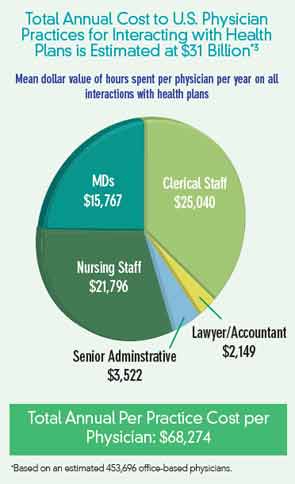

Since the mid 2000s, unprecedented changes in healthcare coverage have been looming over both payers and providers. With this influx of changes and strict regulations on such areas as quality, transparency, and compliance, the strain and cost of dealing with prior authorization and delayed processing of claims has pushed providers to their limit.
Claims processing and prior authorization of physician claims have become a costly administrative burden for most medical practices nationwide. In 2009, researchers with the Commonwealth Fund reported that the administrative cost of dealing with these claims in the United States totaled an estimated $156 billion in 2007, and they project it to reach $315 billion by 2018.1
The claims-management revenue cycle consumes an unsustainable 10%–14% of a practice’s income.2 A sizeable portion of these rising costs can be attributed to money spent having staff monitor the continuous processing of undue insurance-related activities such as validating insurance coverage, obtaining prior authorization for procedures and lab tests, appealing denials and underpayments, and reconciling unpaid claims.
The system continues to become more expensive and wasteful, and the manual processes in place for interacting with insurers may contribute to the problem. The ACR’s practice management department is collaborating with insurers to create a more automated, transparent, and real-time method of handling claims transactions, which should represent substantial progress in streamlining the process. To automate processes and reduce costs, the system should:
- Employ a standardized process that applies to all payers;
- Insert a regular, programmed workflow into the payer and physician-practice systems;
- Eliminate manual transactions between payers and providers; and
- Standardize payer and provider interaction processes and regulations.
To accomplish these goals, we must identify the portion of expenditures that go to administrative burdens that can be reduced by increasing the efficiency of the billing and insurance verification system. This also highlights the need for administrative simplicity and harmony. There are multiple stakeholders involved in the system, and there is value in broadening the scope of our collaboration to improve the system.
Overview of the Cost
On June 17, the American Medical Association (AMA) released the 2013 AMA National Health Insurer Report Card, its annual report on health insurers, including their patterns for processing and paying medical claims. The report concluded that administrative tasks associated with avoidable errors, inefficiency, and waste in the medical claims process resulted in an average cost of $2.36 per claim for physicians and insurers. Visit www.ama-assn.org/go/reportcard to access the report’s results.
Another study noted that practice staff spend at least 20 hours per week, on average, handling prior authorizations and claims denials.3 This study estimated that practices spend an average of $68,274 per physician annually for a variety of interactions with health insurance representatives. These costs are not built into any reimbursement system and are similar to the unfunded mandates that plague physician practices.
Key findings from this study indicate that:
- Physicians spend, on average, approximately three weeks per year interacting with health plans, which is equivalent to three hours per week. Medical specialists’ interactions equal 2.6 hours per week.
- Nursing staff spend, on average, 23 weeks per year, per physician, and clerical staff spend a total of 44 weeks per year interacting with health plans.
- Physicians spend more time than ever dealing with plan formularies—approximately 1.7 hours per week—along with reviewing health plan quality data.
In the book, The Healthcare Imperative: Lowering Costs and Improving Outcomes, James L. Heffernan explains that, to potentially save $26 billion in billing operations nationwide—including saving up to four hours of professional time per physician per week, and five hours of practice support staff time per week—all payers should operate with the same set of administrative guidelines for insurance billing requirements that Medicare uses.4
Steps Toward Working Together
It is imperative for physicians and payers to join forces to eliminate waste and reduce costs for both parties. There are several ongoing initiatives designed to help these groups work together. One is to identify a single, transparent set of payment rules in this multipayer healthcare system that could potentially reduce the administrative and cost burden common to every provider billing office.
Current initiatives in the process include:
- Developing standard forms for all payers;
- Improving the electronic standard transaction 5010 system;
- Approaching multiple stakeholders in an effort to standardize data capture and promote transparency in regulations;
- Backing federal and state initiatives and legal requirements; and
- Supporting the AMA’s “Heal the Claims Process” campaign. This campaign is designed to help physician practices streamline their claims process by providing point-of-care pricing and accepting patient payment at the time of service.
Excessive administrative costs in various areas of the billing and reimbursement system are a problem that needs to be addressed nationwide. The AMA estimates that $12 billion a year could be saved if insurers eliminated unnecessary administrative tasks with automated systems for processing and paying medical claims. This savings represents 21% of physicians’ total administrative expenses to ensure accurate payments from insurers.
The ACR recognizes these burdens on rheumatology practices and is dedicated to working with members to address both individual and system-wide insurance issues. The ACR is continuously creating programs to bring awareness to payers and providers on eliminating waste and alleviating administrative burdens. Through the ACR’s Insurance Subcommittee (ISC), the organization strives to collaborate with health plans nationwide to influence policies and address standardization of claims process and prior authorization to eliminate waste and reduce costs.
If you have an insurance issue, ask the ISC for help! The subcommittee cannot negotiate contracts for physicians, but its members are willing and able to investigate unfair practices from insurance companies that would put a patient’s health at risk from their disease. Please fill out the ACR health plan complaints form at www.rheumatology.org/practice/officesupport/insurance regarding your insurance issue, and the ACR staff and ISC will do their part to assist you.
Visit the ACR website at www.rheumatology.org/practice for all your practice needs. For questions or additional information on claims processing or denials, contact the ACR practice management department at [email protected].
References
- Collins SR, Nuzum R, Rustgi SD, Mika S, Schoen C, Davis K. How health care reform can lower the costs of insurance administration. Issue Brief (Commonw Fund). 2009; 61:1-19.
- TripleTree LLC. Healthcare revenue cycle management: A TripleTree industry analysis. 2006.
- Casalino LP, Nicholson S, Gans DN, et al. What does it cost physician practices to interact with health insurance plans? Health Aff (Millwood). 2009;28:w533-w543.
- Institute of Medicine. The healthcare imperative: Lowering costs and improving outcomes: Workshop series summary. Washington, DC: The National Academies Press. 2010.

